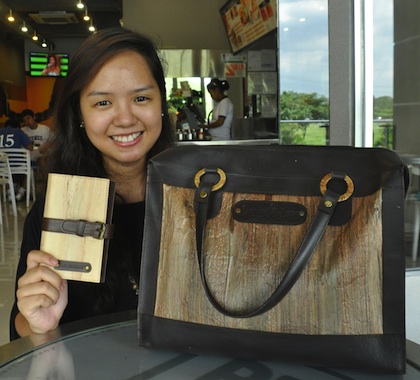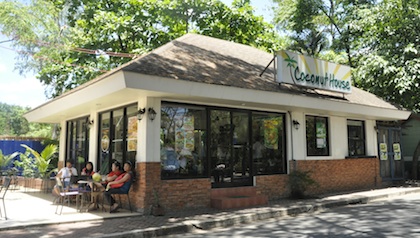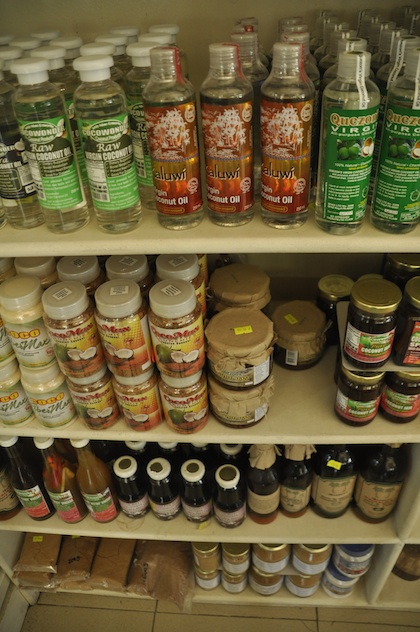SUMMARY
This is AI generated summarization, which may have errors. For context, always refer to the full article.

MANILA, Philippines – “We want to make social entrepreneurship sexy,” says Karl Satinitigan, the 24-year-old director of Gawad Kalinga’s Center for Social Innovation or CSI, a program that trains aspiring social entrepreneurs.
During CSI Night, held every Tuesday at the GK Enchanted Cafe, something seems to be cooking: something big, exciting and unstoppable. It’s called social entrepreneurship.
One entrepreneur has quit his executive position from a multinational company, another used to be a public counsel. Apparently, compassion is fast becoming the new sexy.
According to Tony Meloto, founder of Gawad Kalinga and trailblazer of social entrepreneurship in the Philippines, social entrepreneurship is social innovation. It is people who are committed to change coming together to make it happen.
Social entrepreneurship is also change in how people do business. “The faults of old capitalism are cut-throat competition, excessive consumerism and unbridled greed wherein you want maximum profit. Social enterprise is enlightened capitalism that believes that doing good makes good business,” he says.

Coconut House
A prime example is Jun Castillo’s Coconut House, a restaurant business that embodies his advocacy to transform the coconut industry and help Filipino coconut farmers. According to Castillo, the 3.5 million coconut farmers in the Philippines are some of the most impoverished in the country despite the coconut industry making up 20% of the country’s agriculture.
This is because, according to him, “only the big businessmen benefit from the industry.” In what Castillo calls the “old industry,” only one part of the coconut is developed – copra, which is used to make soaps, detergents and explosives. The remaining three-fourths of the valuable parts of the coconut are thrown away.
Castillo’s advocacy is to put an end to this “old industry” to give way to the new in which all elements of the coconut are developed and maximized, allowing farmers to have a greater share in the profit.
To this end, Castillo has been teaching farmers how to develop coconut water which is different from buko juice because it comes from mature coconuts and contains more nutrients. In fact, Castillo says, “It contains more nutrients than Gatorade.”

Drinking coconut water has become popular for Hollywood celebrities who want to stay fit yet Filipino coconut farmers throw away 4 billion liters of coconut water every year. If coconut farmers could only maximize this part of the coconut, Castillo says, “It could earn them higher than copra at P20 billion a year!”
In Coconut House, a charming restaurant surrounded by the lush verdure of Quezon Memorial Circle, all dishes and desserts served have some form or part of coconut in them. There’s coconut milk-based ice cream, gatadobo, pancit buko, coco okoy made of coconut flour and many more.
Not only does it serve healthy, organic and delicious meals for adventurous and hungry customers, it’s helping create a market for all parts of the coconut for the benefit of coconut farmers who simply aren’t getting enough from the old, copra-centric industry.
Though many established social entrepreneurs are veterans like Jun Castillo and GK’s Tony Meloto, according to the GK founder, “the young own the future.”
More and more social entrepreneurs are starting their enterprises in their early 20s-30s.
Jacinto & Lirio
In the case of Noreen Bautista and the 4 others who created the eco-fashion brand Jacinto & Lirio, they started even before graduating from college.
J & L, as their brand is also known, creates beautifully-designed and elegantly-crafted bags and notebooks for the high-end market out of water hyacinth leatherette. Water hyacinth is one of the most invasive plants in the world, clogging lakes and rivers in the Philippines, aggravating floods and causing much grief to nearby villages.
J & L helps turn this nuisance of a plant into a source of income for the villagers by buying the leatherette made from the stalks of the water hyacinth and transforming them into gorgeous bags.
After winning P350,000 to turn their business idea into a reality, they partnered with designer Cora Jacobs who helped them come up with their first collection. Now they’ve expanded to include a line of notebooks called Kwaderno which they are branding as the Philippine version of Moleskin.
Noreen hopes to build J & L as an international brand, part of a scheme to uplift the quality and reputation of Filipino brands.
But more than that, the driving force behind J & L are the communities in Pampanga, Laguna, Rizal and Pasig they are supporting.
Noreen fondly recalls getting a text message from one nanay telling her that J & L enabled her to pay for her goiter operation. Another nanay said it helped her pay for hospital expenses when she gave birth to her child. This is the kind of impact social enterprises hope to make, bit by bit, one community member at a time.
J & L is riding on the eco-fashion trend along with such brands as Toms, Human Nature and Rags2Riches. Noreen explains the rise of this trend by pointing out that more and more consumers are becoming aware of the impact of consumerism on the environment and society.
Because of social media and the Internet, there are more avenues for people to voice out their thoughts, question the integrity of brands and inform others about “socially-responsible” brands and products.
Noreen hopes that J & L’s having communities to support becomes a rallying point for customers. But she is careful to emphasize that social enterprises shouldn’t just bank on compassion tactics to get sales. In the end, whether or not they help build a village, products being sold should live up to standards of quality and excellence.
A Bright Future
Noreen shares the optimism for the future that Tony Meloto, Karl Satinitigan and many other social entrepreneurs have. “Now is the perfect time to start a social enterprise,” she says. That’s why one of her pet projects is a website devoted to social entrepreneurship.
Entrepsbuild.ph which is short for “Entrepreneurs Build Society” is a website that aims to spread social enterprise success stories and inform promising social entrepreneurs about events and opportunities that could lead them to the right direction. The website is still in the works but she says it’s slated to come out very soon.
Tony Meloto echoes her optimism when he says, “It’s the mood of the times. Former colonies have found their soul. It’s the Asian age. Hope lies in Third World economies and capital is flowing.”
Noreen is not surprised that many of those infected by the “mood of the times” are her fellow Filipino youth. “Our generation is so restless, always looking for meaning. They’re clamoring for careers that have an impact on society. Young people don’t want the cubicle career. They’re looking for work they’re really passionate about.”
This seems to jibe with the fact that many social entrepreneurs being trained by the GK CSI program come from corporate jobs. According to Karl, who is director of the program and has heard so many of these stories, “They leave their corporate life because they’re not happy. And they realize that now is the perfect time in your life to take risks. You don’t have bills or car loans to pay.”
But Karl is quick to stress that this career is not for everybody. “We don’t guarantee success, but it’s fulfilling.”
During one CSI Night, the room was buzzing with ideas and the tension of ill-disguised excitement. On one side of the room is a young man who owns a business that makes bicycles out of bamboo. On the other side is a 20-something woman who is helping coffee bean farmers in Cebu distribute their products in Metro Manila. They had just finished hearing Tony Meloto enthuse about Gawad Kalinga winning the Skoll Award, regarded as the Nobel Prize in the world of social entrepreneurship.
Standing in this room, who wouldn’t believe that social enterprise is the hippest party in town? When asked how he would make social entrepreneurship sound sexy, Karl says, “I think it’s about time that we make businesses that leave no one behind. Everyone’s invited.” – Rappler.com
You might like:
- Co.lab xchange makes social entrepreneurship ‘sexy’
- He said, she said: 2 tales of social entrepreneurs
Add a comment
How does this make you feel?

There are no comments yet. Add your comment to start the conversation.